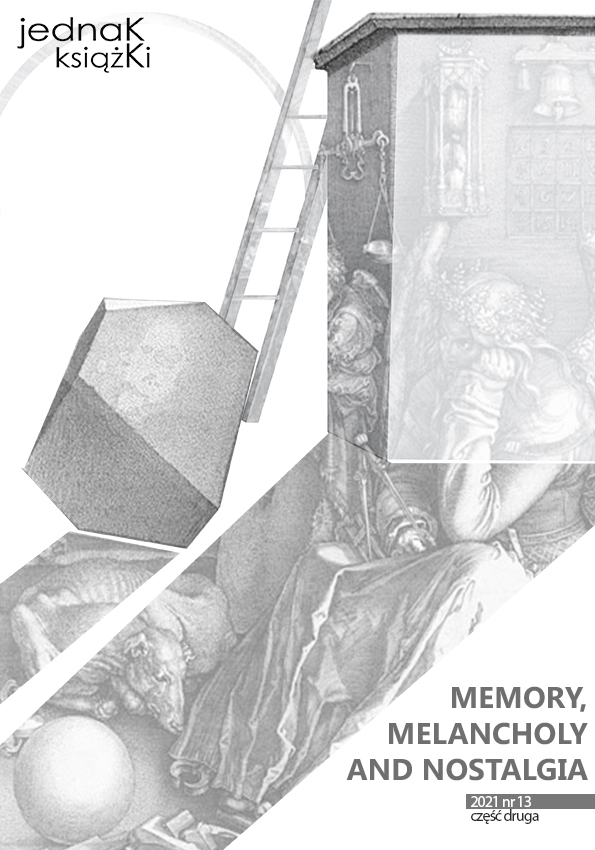Nostalgia, Depression and Suicide as the Consequence of Acquired and Inherited Trauma in Amelia Rosselli’s Poetry
DOI:
https://doi.org/10.26881/jk.2021.13.08Słowa kluczowe:
nostalgia, depression, suicide, trauma, Amelia RosselliAbstrakt
In one of her many poetic motivation descriptions included in her literary works and comments, Amelia Rosselli points to tough-life experience as a factor influencing her artistic creativity. The Italian twentieth-century poet repeatedly emphasizes a direct impact of mental well-being as the driving force of her writing process. A gloomy flashback, hand in hand with a concept, experience, and fantasy, influence the expression of her pieces and structures the literary space. A minor overtoned reference to the grievous reality of Fascist Italy connected with the murder-for-hire of family members, sudden and premature death of her sweetheart and brother, mental illness in the context of the DNA memory, and, finally, the promise of suicide had all impacted noticeably upon the verses of her poems. Another thing worth mentioning is the issue of stress and hardships lived through by Amelia Rosselli’s mother and her immediate relatives just prior to the poet’s birth. According to the latest developments in medicine and cognitive sciences, any psychical damage influences bodily and mental functioning of persons not only directly affected by them, but also their descendants. The linguistic terms applied in the pieces of the Italian poet provoke a discussion of the phenomenon of post-memory. The term, which was proposed by Marianne Hirsch to refer to collective trauma inheritance, has been recently broadened by psychologists to encompass individual memory as well. The fragments written in four language codes (Italian, French, English, and music notation) offer hints to be used in the psycho-emotional analysis of the poet. Additionally, scrutinizing Amelia Rosselli’s nostalgic lyrical pieces, we can discern, by referring to psychological sciences, how the composition-making can constitute an auto-psychotherapy procedure. In terms of interdisciplinarity, the experience of melancholy and nostalgia in Amelia Rosselli’s artistic creativity covers the psychological, social, historical, cultural, political, and artistic areas.
Downloads
Bibliografia
Bolaños Atienza María. 2008. Jak czytać sztukę. Toruń: Buchmann.
Bisanti Tatiana. 2007. Opera plurilingue di Amelia Rosselli. Pisa: Edizioni ETS.
Bradford Nikki. 1998. The Miraculous World of Your Unborn Baby. Surrey: Contemporary Books.
Marano Giampiero. 2018. „Ecco che è tempo di risplendere.” Online: https:// criticaitalianablog.wordpress.com/2018/02/19/ecco-che-e-tempo-di-risplendere-lapatria-meridionale-di-amelia-rosselli/. Accessed March 27, 2021.
La Penna Daniela. 2013. La promessa di un semplice linguaggio. Lingua e stile nella poesia di Amelia Rosselli. Rome: Carocci.
Mengaldo Pier Vincenzo, ed. 1978. Poeti italiani del Novecento. Milan: Mondadori.
Miller Alice. 2007. Saving Your Life. New York: Norton & Company.
Miller Alice. 2009. Free from Lies: Discovering Your True Needs. New York: Norton & Company.
Rosselli Amelia. 1980. Diario in tre lingue. In: Primi scritti 1952–1963, 69–115. Milan: Guanda.
Rosselli Amelia. 1980. Le Chinois à Rome. In: Primi scritti 1952–1963, 47–54. Milan: Guanda.
Rosselli Amelia. 1987. Spazi metrici. In: Spagnoletti Giacinto, ed. Antologia poetica, 75–89. Milan: Garzanti.
Wolynn Mark. 2016. It Didn’t Start with You: How Inherited Family Trauma Shapes Who We Are and How to End the Cycle. London: Penguin.

 Uniwersyteckie Czasopisma Naukowe
Uniwersyteckie Czasopisma Naukowe





